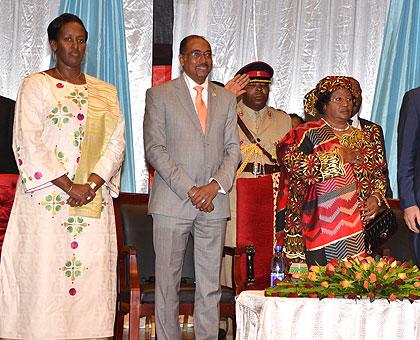The First Lady, Jeannette Kagame, has called on actors in the global anti-AIDS movement to leverage on what has been achieved in the prevention and dealing with effects of HIV/AIDS in order to design effective strategies to avoid new infections.


The First Lady, Jeannette Kagame, has called on actors in the global anti-AIDS movement to leverage on what has been achieved in the prevention and dealing with effects of HIV/AIDS in order to design effective strategies to avoid new infections.
She was speaking at the first meeting of the UNAIDS and LANCET Commission which was hosted by President Joyce Banda of Malawi in the country’s capital Lilongwe on Friday and Saturday this week.
The commission was launched in May 2013 to draw lessons from the AIDS experience and find ways to move to sustainable health.
The commission’s goal is to prescribe ways of using resources available for HIV/AIDS to build stronger and more sustainable health systems in order to realise targets of zero new HIV infections, zero discrimination and zero AIDS-related deaths.
Mrs. Kagame is one of the commission’s 30 commissioners that includes politicians, scientists and donors.
"Today is approximately one generation after the first incident of HIV occurred. We are here to shape the debate on the future of global health,” she said.
She highlighted achievements in the fight against HIV/AIDS such as the mobilisation of communities to stand against the scourge, prevention of mother to child transmission, as well as care and advocacy for children, mothers, and families infected and affected by HIV/AIDS.
"As 2015 nears and with that, the close of the Millennium Development Goals, this is a critical time to be thinking about the challenges that still remain; perhaps the most pressing one is the issue of how to strengthen what we have built and make it more sustainable,” she said.
She highlighted Rwanda’s achievements in the fight against HIV/AIDS such as reducing HIV prevalence from 12 percent to 3 percent and reducing to a half new HIV infections from about 20,000 a year 2000 to around 10,000 infections in 2011.
The achievements also include a six times increase in the trend of testing among young women which moved from about 10 percent in 2005 to almost 60 percent in 2010. Prevention of Mother to Child transmission (PMTCT) services are also available in 85 percent of all health facilities in Rwanda.
The First Lady partly attributed Rwanda’s success in the fight against HIV/AIDS to community medical insurance scheme, Mutuelle de Santé, which makes healthcare more accessible as well as the use of thousands of Community Health Workers across the country to sensitise and teach members of their communities about HIV prevention, testing and adherence to treatment.
She recommended the universal access to healthcare, more scientific research and strong regulatory systems in Africa to have a strong health sector.
As a joint project of the United Nations Programme on HIV/AIDS (UNAIDS) and leading medical journal, The Lancet, the UNAIDS and LANCET Commission works to explore the post-2015 agenda of AIDS and global health.
The commission is co-chaired by Malawi President Joyce Banda, African Union Commission Chairperson Nkosazana Dlamini Zuma, and the Director of London School of Hygiene and Tropical Medicine, Peter Piot.
Its policy prescriptions on the way forward in fighting against the disease after 2015 will be inspired by a diverse group of HIV and health experts, young people, activists and political leaders.


